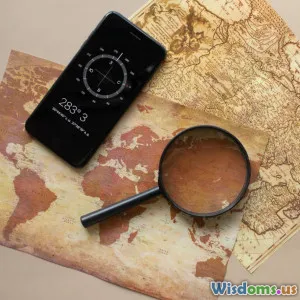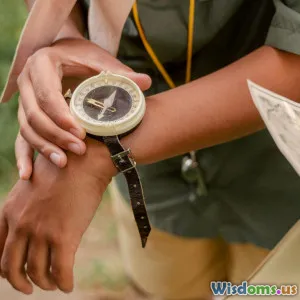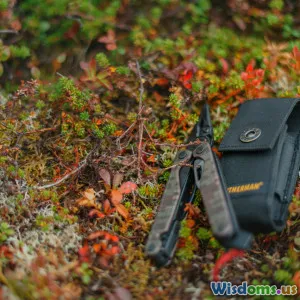
Why Compasses Beat GPS in Deep Wilderness Survival
8 min read Explore why traditional compasses outperform GPS devices in deep wilderness survival situations and learn practical tips for reliable navigation. (0 Reviews)
Why Compasses Beat GPS in Deep Wilderness Survival
Navigating vast, untouched wilderness can be a daunting challenge—even for seasoned adventurers. In an era dominated by satellite technology, smartphones, and GPS devices, many assume that digital navigation tools are foolproof. However, when pushed to the limits of survival deep in the wilderness, it’s the humble compass that still leads the way. This article explores why compasses outperform GPS devices in harsh survival conditions, demonstrating the intrinsic value of mastering traditional navigation.
The Overreliance on GPS: An Unexpected Risk
Global Positioning System (GPS) technology revolutionized navigation by offering instant location data worldwide. From hikers and hunters to emergency responders, GPS is commonly relied on for direction. Yet, GPS devices depend on several factors that can fail unexpectedly:
- Battery Life: Most GPS units rely on batteries or solar charging; deep in the wilderness, replacements may not be available.
- Signal Availability: GPS requires a clear line of sight to satellites. Dense forests, deep valleys, or severe weather can block or degrade signals.
- Electronic Malfunctions: GPS devices are susceptible to hardware or software failures, exposure to water, extreme temperatures, or physical impacts.
Consider the case of a 2018 Alaskan mountaineer who lost GPS signal due to overcast skies and experienced battery depletion. His survival instincts and ability to use a compass ensured his safe return. Such real-world incidents highlight the limitations of relying exclusively on digital technology.
The Compass: A Survivor’s Trusted Ally
Battery-Free Independence
Unlike GPS devices, compasses require no battery power or satellite connection. Their working principle—aligning with Earth's magnetic field—means they reliably indicate magnetic north continuously. In remote survival scenarios, this independence is invaluable.
Simplicity and Durability
A basic compass’s rugged design often makes it more durable than delicate electronic devices. They are typically water-resistant, impervious to temperature extremes, and resistant to physical shocks. This robustness ensures that, even under adverse conditions, a compass functions.
Universally Reliable Navigation
While GPS devices provide latitude and longitude, they require skill to translate positional data into practical navigation, often through digital maps. A compass, coupled with a map and the knowledge of techniques such as taking bearings, makes it straightforward to identify direction and navigate terrain efficiently.
Case Study: The 2015 Australian Outback Rescue
In 2015, a lost hiker in the Australian Outback managed to survive for nine days with minimal supplies. Although her handheld GPS failed, her manual compass guided her to safety. This example demonstrates the life-saving potential of traditional navigation tools when technology falls short.
Navigation Techniques That Amplify Compass Effectiveness
Having a compass is essential, but knowing how to use it effectively is a survival skill that doubles the chances of safe navigation.
Understanding Declination
Magnetic declination—the angle difference between magnetic north and true north—varies by location and must be accounted for when using a compass with a map. Ignoring declination can lead to significant errors, especially over long distances.
Taking Bearings
By aligning a compass with landmarks and adjusting for declination, users can plot precise courses. This technique aids in traversing complex terrain without getting disoriented.
Orienteering Fundamentals
Skills such as triangulating position through visible landmarks enhance navigation confidence. This reduces dependency on any one tool and integrates the compass into a broader situational awareness framework.
Limitations of Compasses and Complementary Tools
No tool is perfect, and compasses have some caveats:
- They are affected by nearby metallic objects or electronic interference, which can deflect the needle.
- They require some knowledge and practice to use effectively under pressure.
Therefore, combining a compass with other traditional techniques—such as reading natural signs and using topographic maps—ensures the greatest reliability.
Why Survival Experts Recommend Carrying Both
Judging by firsthand accounts and expert advice, carrying both a GPS device and a quality compass is optimal. GPS devices provide convenience and detailed spatial data, while compasses guarantee reliable backup navigation. Notably, outdoor organizations like the International Federation of Search and Rescue stress proficiency with manual navigation.
Embracing Traditional Skills in a Technological Age
In his book "Deep Survival," author Laurence Gonzalez writes, "Survival is more than a scenario; it’s a skill and a mindset. The compass symbolizes preparedness—not just a tool but a connection to nature and self-reliance."
By investing time to learn compass navigation, outdoor enthusiasts deepen their understanding of the environment and empower themselves beyond technological crutches. In unpredictable wilderness conditions, such preparedness can mean the difference between life and death.
Conclusion
While GPS technology has become ubiquitous, the compass remains a cornerstone of deep wilderness survival navigation. Its independence from batteries and satellites, resilience under harsh conditions, and straightforward usability underscore its lasting importance. Wilderness travelers should view compasses not as outdated relics but as essential instruments of survival resilience. By mastering compass skills and combining them with modern tools, adventurers prepare themselves to face nature's challenges with confidence and competence.
Remember: The next time you plan a deep wilderness journey, pack a reliable compass, learn to use it thoroughly, and treat it as your most dependable guide when the unexpected occurs.
References:
- Gonzalez, Laurence. "Deep Survival: Who Lives, Who Dies, and Why." W. W. Norton & Company, 2004.
- International Federation of Search and Rescue. "Manual Navigation Techniques for SAR Operations." 2020.
- National Park Service, US Department of the Interior. "Basic Orienteering Skills." 2023.
- Real-world wilderness rescue reports from Australian Outback and Alaskan terrain agencies.
Rate the Post
User Reviews
Popular Posts















